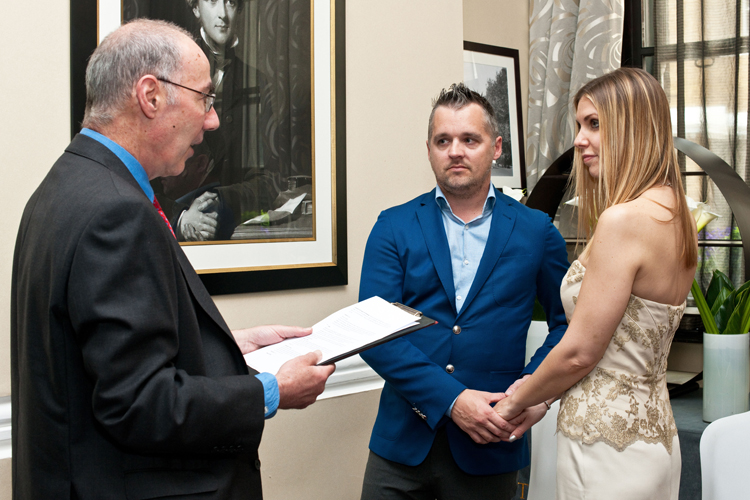
by Michael | Nov 7, 2022 | Blog
Getting Started
Planning your wedding can be fun and really exciting. You’re working together with your loved one (well, usually!) and you’ve got a wonderful target in mind. You can watch the elements gradually coming together and your vision becoming a reality.
That doesn’t mean to say that it‘s simple!
You’ll have to do a lot of thinking (for starters, what budget are you setting?) and be prepared to compromise.
Considerations
You’ll need to weigh up the ceremony you’ll be having. Do you want religion in it at all? If partially, which elements? Do you want a traditional ceremony, a partly wacky one, or a woo-woo one?
How much professional help are you going to go for, or what will you arrange yourselves?
Then, there’s the entertainment and catering (which are not really my remit).
The guest list is a potential minefield. How many people will you invite? Who will you leave off the list?!
You may have to consider a whole raft of suppliers. These could include:
Civil celebrant (obviously!); venue, photographer/videographer; musicians; make-up artist; florist; hairdresser; clothes supplier; entertainment; caterers; transport.
The date and even time may require some discussion.
Help
I cover all this fully in my book “Your Wedding Guide” (by Michael Gordon), which is still available on Amazon for a fiver.
Alternatively, feel free to contact me for more advice.
photo: Victor Shack

by Michael | Jan 31, 2022 | Blog
Wedding planning is a very delicate balancing act. First and foremost, bride and groom must see eye-to-eye. Secondly, if other people are involved, their feelings and opinions may not correspond to the couple’s. Thirdly, social distancing and all that goes with it are nowadays part of the mix.
Bride and Groom
In many cases, the bride and bride’s family will be the prime movers in the planning. The groom usually likes the plans run past him, but often doesn’t want deeper involvement.
However, the bride shouldn’t go against his wishes – or behind his back – and risk an altercation on – or after – the wedding day!
Actually, don’t assume that no areas will interest the groom. He will probably want some sort of input into the catering and the venue. Bridesmaids’ dresses may possibly interest him less.
So the bride should try and keep him in the picture. The couple should discuss any issues – amicably! They both need to agree on the venue and officiant.
So let the groom participate in the planning, if he wants to. Accept that not every groom will be enthused, though. Give-and-take may be the order of the day(s).
Wedding Party
Of course, others may be playing a part. If we have a team, do we include bridesmaid, flower-girl, usher, Best Man, parent, and so on, in the planning? If so, how much notice should be paid to their views?
The bottom line is that the wedding is the couple’s affair, so whatever they want ought to count. Even if someone else is bankrolling the affair, it is still the couple’s big day.
However, if they are expecting others to contribute (whether financially or as an active participant), there may be a need for some compromise. Consultation is important. Nobody should be forced to go against their wishes or take on a role they’re really unwilling to adopt.
The middle course may be the order of the day. Possibly, somebody who might otherwise be overlooked could be invited to read a poem. Perhaps a moody youngster can be put in charge of the wedding presents. A bridesmaid, reluctant to wear a certain dress, can be given a bunch of flowers in recompense.
Most families are willing – and able – to reach a balance, and a wonderful day can be had by all.
If you have any thoughts or questions arising from this, feel free to contact me.

by Michael | Mar 1, 2021 | Blog
As a celebrant, my first reaction to the government’s irreversible “roadmap” last week was relief. At least, we could celebrate weddings with no restrictions from 21st June. After all, it usually takes a good few months to plan a wedding, so we could probably get started with the process now. All good.
However, although that has shown a ‘green light’ for a number of couples, the anticipated rush does not seem to have materialised. At least, not among my contacts. Why would this be?
Probably because couples feel they should err on the side of caution. There have been so many about-turns or tweaks over the last year. Why go through all the trouble of planning, when everything may yet come tumbling down, with all the attendant disappointment and frustration?
The UK Wedding taskforce have just written again to Paul Scully, Minister for Small Business. They point out that wedding receptions for any less than 50 are simply not commercially viable. (Obviously, that impacts on suppliers’ livelihoods.)
As for couples, the UK now benefits from world class testing and a second-to-none vaccine programme but unfathomably we are still constrained by the same restricted guest numbers (15 and 30) that were placed on the sector at the beginning of the pandemic.
Weddings are by definition highly planned and managed affairs, so it should be possible to feed into the Test and Trace system. Venues are licensed and will be more Covid-secure than comparable sectors.
I don’t know whether we can expect any more progress on the political front for now, but I’d be more than happy to have a chat to anyone seriously thinking about a personalised, celebrant-led ceremony. Even if it’s before 21st June!

by Michael | Feb 1, 2021 | Blog
Wedding planning is a very delicate balancing act. First and foremost, bride and groom must see eye-to-eye. Secondly, other people may well be involved, and their feelings and opinions may not correspond to the couple’s. Thirdly, there is social distancing and all that goes with it to bargain for.
Bride and Groom
In many cases, the bride and bride’s family will be the prime movers in the planning. The groom usually likes the plans run past him, but often doesn’t want deeper involvement.
However, the bride shouldn’t go against his wishes – or behind his back – and risk an altercation on – or after – the wedding day!
Actually, don’t assume that no areas will interest the groom. He will probably want some sort of input into the catering and the venue. Bridesmaids’ dresses may possibly interest him less.
So the bride should try and keep him in the picture. The couple should discuss any issues – amicably! They both need to agree on the venue and officiant.
So let the groom participate in the planning, if he likes. Accept that it may not enthuse him that much, though. Give-and-take may be the order of the day(s).
Wedding Party
Of course, others may be playing a part. Do we include bridesmaid, flower-girl, usher, Best Man, parent, and so on, in the planning? How much notice should be paid to their views?
The bottom line is that the wedding is the couple’s affair, so whatever they want ought to count. Even if someone else is bankrolling the affair, it is still the couple’s big day.
However, if they are expecting others to contribute (whether financially or as an active participant), there may need to be some compromise. Consultation is important. Nobody should be forced to go against their wishes or take on a role they’re really unwilling to adopt.
The middle course may be the order of the day. Possibly, somebody who might otherwise be overlooked could be invited to read a poem, say. Perhaps a moody youngster can be put in charge of the wedding presents. A bridesmaid, reluctant to wear a certain dress, can be given a bunch of flowers in recompense.
Social Distancing
You don’t need me to point out that it is currently well-nigh impossible to plan for a big, or even, moderate-sized, wedding. If you don’t know how many guests you will be allowed to invite, how can you book the venue, catering, entertainment etc.?
So it may be an idea to marry legally (ie small register office ceremony) as soon as you wish. Then celebrate the ceremony (officiated by your civil celebrant of choice) and reception you really wanted a year down the line (on your first anniversary, say).
Eventually …
Whenever you are able to marry as you want, remember that it is likely to be a team effort.
Most families are willing – and able – to reach a balance, and a wonderful day is had by all.
If you have any thoughts or questions arising from this, feel free to contact me.
by Michael | Dec 9, 2019 | Blog
We all need wedding suppliers – or do we?
If you’re celebrating a wedding on a truly small scale, you may be able to organise everything yourself. And it may well all come together successfully. However, if the guest-list goes into double figures, you’re less likely to cope.
You can go to the Cash & Carry and buy in a load of food and drink. You’ll probably want to clean the place up first before decorating. How will you serve refreshments? How will you arrange the room in your house to accommodate a large-ish number? Are you using the back garden? Supposing it rains? Have you warned the neighbours? Will there be a sound system? Have you avoided trailing wires and trip hazards?
So, rather than exhaust yourself before the event even starts, I suggest you hire some suppliers.
Wedding Planner
If your
wedding is likely to be big and potentially complex, then get yourself a
professional wedding planner. Otherwise, there may be an event planner who
comes with the venue you book, or – if you think you can handle it – you go for
it yourself.
Venue
Visit as
many venues as it takes. Once your heart says “yes”, go with it. But, obviously,
the price must be right and you must feel confident about the planner there.
The venue must be one of the first things to book, and some get taken over a year in advance.
Ceremony
If you’re
not having a full religious service, you may want more than the Registrars’
standard ceremony. They do the legal bit, but they do not personalise. For
that, contact a civil celebrant.
Working together with your civil celebrant, you can achieve the unique ceremony of your dreams.
Musicians
You may want
music, either at the wedding ceremony or at the reception (or both). Then you
have to decide whether it should be live or recorded, whether you’re having a
DJ or a friend to push a button.
Who is
providing the sound equipment?
Entertainment
Whatever you
choose to hire will probably need to be booked well in advance. Depending on
budget or choice, you can offer your guests all kinds of shows and
participatory events.
Food, drink and catering
Again, this is where a planner can earn their keep. Are you having some drinks and hors d’oeuvres before the meal? Will the meal be buffet or silver service? What – and how much – drink will you offer? Will you have a cash bar? What about vegans and those on gluten-free or dairy-free regimes? Do you want a special table for children?
Photographers
You definitely need to have a photographic record of your big day. How many photographers – or videographers? – you have is down to you. Don’t ask a friend to do it (even though you save money): he/she may accidentally fail to deliver, which you really wouldn’t thank them for. Moreover, the friend is there to be part of your wedding, not to worry about the pictures.
Florists
Most of us
want flowers at such an occasion – seasonal ones are usually cheaper than ones
flown in.
There may well be other suppliers you’d want to employ (such as caterers, drivers, cake-makers, magicians), but I hope that this article gives at least a reasonable idea of what is involved in planning a wedding.
It may look daunting, but professional suppliers can manage it smoothly for you.
If you have any questions or comments, especially about ceremonies, please feel free to contact me.
Photo: Matt Penberthy




